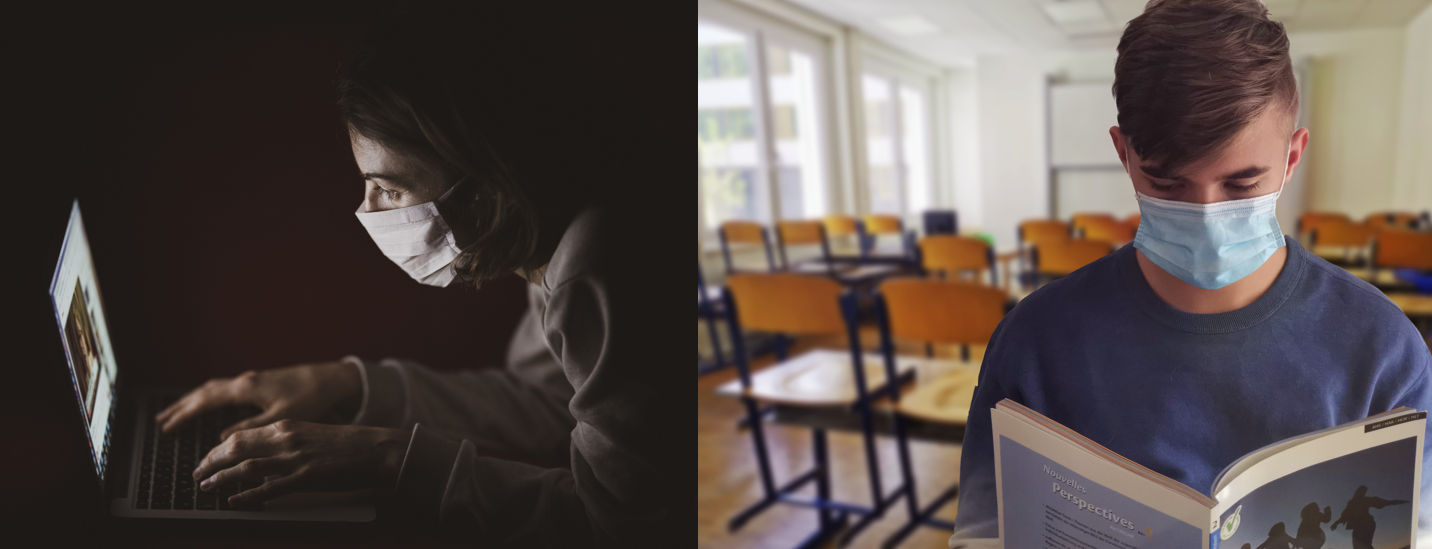Health mutuals, Social and Solidarity Economy (SSE) companies, education unions and other civil society organisations, the members of the Education and Solidarity Network (ESN) have been at the heart of the health and education crisis and the first to respond on the ground. They analyse the challenges they have faced, the responses they have provided and explain how they want to turn this moment of crisis into an opportunity to strengthen impact projects to guarantee access to health, social protection and education for all. And now more than ever, to bring their values of solidarity to life.
Front line carers and teachers
In just a few months, Covid-19 has affected the way humanity lives. First of all, the resilience of health systems around the world has been put to the test. In some countries, already fragile health systems have been pushed to the brink of collapse by the epidemic, with dramatic consequences for access to other health services, including reduced maternal and child health services.
The health crisis has become a social and humanitarian crisis. This happened because the human right to social security is not yet a reality for a major part of the world’s population: today 55% of the world’s population has no form of social protection. It is these more than 4 billion people without access to healthcare, family support and unemployment assistance who have been most severely affected by the pandemic.
The education system was immediately affected. More than 1.6 billion pupils and 63 million primary and secondary school teachers have been affected by the educational crisis resulting from Covid-19, with sometimes dramatic consequences: casualisation of education staff, mental health problems, school dropouts, increased violence, loss of access to school health services or food, and an increase in child labour. It is therefore likely that millions of children – especially girls – will not return to school as a result of the coronavirus outbreak.
Never has the interdependence between health and education been clearer. It is this link between these two worlds that has led our various SSE and civil society organisations to come together to form a network. We are convinced that a healthy student learns better and for longer. Through education, they will be able to make healthier life choices in the future. Similarly, having a physically and mentally healthy teacher contributes to the quality of education. We therefore maintain that health and safety in schools are preconditions for the creation of quality education systems, while schools are in turn privileged spaces for the promotion of health, and learning about equality and solidarity. Together as education unions and health mutuals around the world, we defend public, free, quality education, we act for access to health care, social protection, mutual care and decent work for all.
Maintaining “warm solidarity” to face the pandemic
Our structures have also been affected in their daily functioning by the coronavirus outbreak. From the abrupt interruption of sources of income due to stopping all activities during lockdown (Burkina Faso), to members having difficulties in paying subscription fees to health mutuals (Republic of the Congo), to the reduction or postponement of international cooperation funding, the crisis has tested the financial strength of our organisations.
In this difficult situation, our members, true local actors, have worked to put in place the best solutions available for the benefit of students, patients, members, families, colleagues and vulnerable people. This was done to respond to the urgency of the situation, without renouncing our culture and our model of solidarity and democratic entrepreneurship.
From the beginning of the crisis, trade union organisations have supported their colleagues remotely and in the field to ensure pedagogical continuity and defend the safety of education staff, often in the absence of resources to provide education remotely, and sometimes in the face of contradictory injunctions from their relevant ministries. Unions have also been involved in organising the return to school, coping with the stress and anxiety of teachers regarding possible contamination, and often without adequate personal protective equipment.
In hospitals, health centres or care centres for the elderly, the Network’s organisations have helped to ensure the continuity of health services, to take charge of care, or to break down social isolation and support the most vulnerable members of the social security system. Digital tools have made it possible to maintain ties with members, patients and social security contributors, and have also provided tools for prevention, information, health promotion and support, such as the Mesdocteurs remote consultation services (MGEN, France) or the #EnsembleContreLeCovid (together against Covid) platform from VYV Group’s stakeholders (France). In Belgium, mutual companies have committed themselves as field operators in contact tracing and monitoring with a view to break the virus’ chains of transmission, while at the same time laying down the necessary markers in terms of respect for the protection of privacy.
The need to ensure pedagogical continuity remotely has also considerably highlighted educational inequalities. Although the impact of the pandemic varies from one context to another, students and education personnel who were already in vulnerable situations have been the most affected. Learners with computer equipment or family support were able to continue their learning in this unusual situation. But today, more than half of the world’s students have neither internet access nor adequate equipment to benefit from distance education programmes, as the poorest households do not have access to television or radio. In the Gambia, the Gambia Teachers’ Union (GTU) organised the distribution of books and more than 500 solar radios to enable learners in rural areas to access the national distance education programme via radio and television.
As far as the internal functioning of our organisations is concerned, in order to continue to maintain our democratic governance, our bodies and meetings have been held online, in shorter lengths of time but more frequently. The functionality of remote working has also been reconsidered, but this should not preclude the handling of work-life balance issues.

“Human support and local solidarity”
In education as in health, we have seen that face-to-face contact is more than essential. We will thus have to continue to find the right balance between the strength of technology and the importance of relationships, without ever falling into the “all-digital” approach, which opens the door to the commodification of education in many countries.
Innovation, both social and technological, has therefore consisted of taking care of others despite social distancing. This is our reason for being: human support, local solidarity.
In France, the MGEN embodied warm solidarity with a large campaign of appeals to its members. The sole purpose of the campaign was to check up on members, especially those over 75 years of age, to ensure that they were not suffering too much from the isolation of lockdown. In Colombia, one of the challenges faced by health mutuals was to extend home-based services from the cities to remote areas. An operational challenge, as health care providers are not always available in remote areas and the network of public providers does not offer home care. The Costa Rican union Asociación Nacional de Educadores (ANDE) has provided daily food aid to members who have lost their source of income due to the crisis, as well as financial assistance to any members who have been infected with the coronavirus. Finally in Belgium, the association “Un Pass dans l’Impasse”, created by the health mutual Solidaris, has set up a free telephone helpline for self-employed workers in distress.
Revaluing the subjects of prevention, mental health and our types solidarity action
In this crisis situation, social dialogue and trust in education and health workers are now more important than ever. The coronavirus outbreak will consecrate our organisations’ social performance. We have proven that our organisations are resilient and capable of finding solutions to critical challenges, thanks to the first-rate professional and human skills of our staff, activists, employees and partners. We will have to continue to fight to ensure that our agility and expertise, but also the specific nature of our professions and our models of solidarity-based entrepreneurship, are recognised and enhanced.
Within our organisations, the health crisis will also have confirmed our positioning and converted certain subjects for action into priorities.
This period will highlight the importance of creating a culture of prevention, and in particular the key role of health education through educational communities.
In terms of prevention, lessons learned from the crisis have focused on how to disseminate messages to best reach our audiences and encourage new behaviours. They include the co-creation of messages, the importance of the relationship to personal experiences (testimonies of close relatives), the fight against fake news or the promotion of a scientific culture.
The psychological trauma generated by the pandemic has brought the issue of mental health to the forefront. Issues related to stress at work, overwork and burnout were already on our organisations’ agenda, and they continue to develop psychological support systems for their beneficiaries. Ensuring the well-being of teachers and students is also a priority for education systems and teachers’ unions today.
In Colombia, the organisation Gestarsalud sees this as an opportunity to accelerate projects that enable action to be taken on the main determinants of health, including food and nutritional sovereignty and security. In this way, the aim is to have an impact not only on improving health itself, but also on the generation of income for families and communities.
Finally, from an operational and strategic point of view, the crisis has highlighted the need for some of our organisations to strengthen their operating model and their capacities for action (new communication and intervention tools for beneficiaries, search for new funding), or even the interest in accelerating collaboration, to the point of coming together in groups in order to cushion such shocks as much as possible.

International exchange and cooperation to return to the fundamentals of co-existence
Can this crisis help us to build tomorrow’s society together?
In contrast, the Covid-19 crisis exposed some central findings: the global interdependence of states in the face of the threats of pandemics and climate change, the dangers of neo-liberal policies, the inequalities caused by the privatisation of education and health, the urgency of putting in place comprehensive, universal and collectively financed social protection systems.
This health catastrophe was a real wake-up call. It reminded us that health, education and solidarity against the risks of life are the cornerstones of our societies and, by the same token, reminded us of the essential role of health care workers and educators. It also demonstrated that a model favouring cooperation for the common good is best suited to tackle these health, social and environmental crises.
We remain vigilant in the face of the many unknowns linked to the evolution of the pandemic: we fear the health risks, the extent of the economic and social crisis, and we continue to be alarmed by political manipulation and attacks on social and environmental achievements.
Above all, however, we are confident in our collective ability to meet these social, economic and ecological challenges. We are optimistic about the capacity to mobilise young people on solidarity issues. We are confident in our organisations, which are true forces for change and which maintain in their DNA the concern for others, solidarity and democracy.
More than ever, we will continue to act to ensure quality education, access to health care and social protection for all on a global scale. To this end, we are calling for cooperation on the subjects of sustainable development in the broadest sense, for sharing good practices for the promotion of the physical and mental health of educational communities, for exchanging views in order to foster solidarity-based ways of doing business and public policies that place the human being at the centre. Let’s mobilise our collective intelligence and join forces for a second wave of solidarity!




